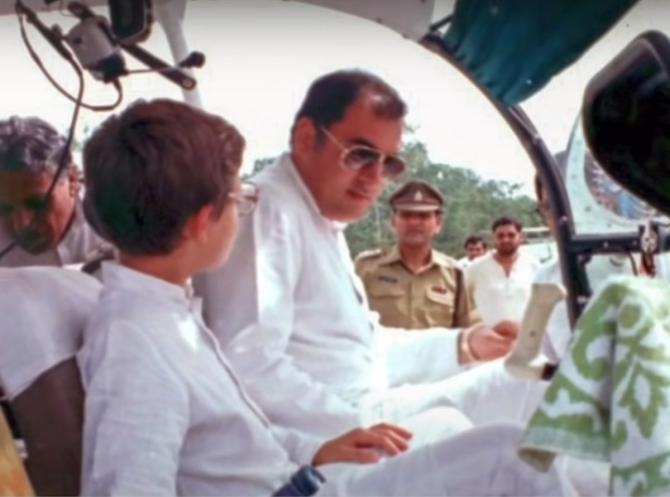Very few know of his scintillating mind, the outpouring of fresh ideas, the attention to detail in every endeavour, the extraordinary administrative and organisational skills, and a limitless stamina and energy with which he pursues every interest and commitment, notes Ambassador Talmiz Ahmad.

Mani Shankar Aiyar has been a unique phenomenon in Indian diplomacy and politics.
He has frequently been in the news for all the wrong reasons -- an ill-advised quip, a harsh repartee, an offhand remark seen as a barb.
These have made him 'controversial', a kiss of death in India where conformity is respected and mediocrity encouraged.
Very few know of his scintillating mind, the outpouring of fresh ideas, the attention to detail in every endeavour, the extraordinary administrative and organisational skills, and a limitless stamina and energy with which he pursues every interest and commitment.
Many however know he does not suffer fools, is impatient with misconduct and injustice and rejects every expression of cant and prejudice.
He has intense loyalty towards those he regards as friends, and is deeply wounded when let down.
Not surprisingly, he has few friends in his own Congress party and is viscerally disliked by cohorts of the Bharatiya Janata Party.
This memoirs penned by Mani (as his friends call him) should go some way in explaining the wellsprings of this contrary person.
The narration is anecdotal, with every page suffused with episodes that show our hero at his funny and self-deprecating best.
But these stories say little about the protagonist's real anxieties and achievements, the details of the challenges he faced or the significant successes he had.
The understated text compels the reader to draw his own conclusions about the persona of the author.
Mani had a chequered career in diplomatic service.
He got encouragement and support during his two stints in Brussels and as consul general in Karachi, while evoking the intense dislike of his two bosses in Baghdad and Hanoi, being sent back from the latter after just a nine-month stint.
He fared better in the ministry -- first as under secretary handling economic assistance to Bangladesh just after the war, and later as spokesman and as the head of the UN Division.
We can only conclude that Mani was a difficult colleague who got on well with those who could look beyond his irreverent and irritating facade and see the talent and the gravitas that was central to his persona and not feel threatened by him.
Mani gave of his best in two locales -- in Karachi as consul general and in the prime minister's office with Rajiv Gandhi.
His Karachi posting (1978-1982) is covered in over 50 pages and shows Mani at his best in his engagements with India's avowed enemy next door.
His extrovert personality, his natural empathy with diverse people and his sharp intellect -- all of these qualities were in play as he interacted with Pakistani politicians, businesspeople, culture czars and czarinas, and ordinary citizens.
Forty years later, his tenure is remembered as the best example of Indian diplomacy in Pakistan, though his insistence on pursuing people-to-people ties has had hardly any takers among India's diplomats and political leaders.

Mani has referred to his ties with Rajiv Gandhi as 'the decisive relationship of my career'.
Over a hundred pages, Mani has provided a first-hand view of the personality and the interests and commitments of the prime minister, and the factors that informed the decisions and pronouncements of his leadership.
Over these pages, we can see the slow evolution of ties between the shy and unsure prime minister and the brilliant but erratic officer who had entered his circle.
Rajiv Gandhi emerges as a sincere and hardworking leader, instinctively committed to national harmony and constantly looking to shape schemes to realise his "responsive government".
Over time, Mani became his right-hand man in giving concrete shape to the prime minister's vision and views.

Though the author only briefly mentions them, the most important of these schemes were those relating to Panchayati Raj, the Jawahar Rozgar Yojana, the zonal cultural centres and the Action Plan for a Nuclear Weapons-free and Non-Violent World Order.
The author also points out that Rajiv Gandhi lost some of his self-confidence and idealism when he was buffeted by the Shah Bano, Babri Masjid and Bofors issues, which were robustly used to discredit him personally.
Mani insists that the prime minister was betrayed by some of those closest to him, while also failing to project his government's achievements more effectively.
On Bofors, Rajiv Gandhi was exonerated of all wrongdoing in the Delhi high court in February 2004.
A later attempt to revive the case in November 2018 was thrown out by the Supreme Court.
But the book also brings out that, following his defeat in 1989, the communal virus had already seeped into the top echelons of the Congress leadership.
While the former prime minister was carrying out his Sadhabhavana Yatra for communal harmony, in early 1990, Mani found both P V Narasimha Rao and V N Gadgil 'denigrating the traditional Congress line on secularism'.
They also demanded answers on issues that today animate the BJP: Uniform Civil c=Code, Shah Bano, Article 370, Vande Mataram, Christian missionary activity, etc.
Looking back, we can see that, through his public life, Mani Shankar shaped for himself a personal furrow: Along the way he enriched some with the gift of his friendship and enraged many with his barbs and vituperation.
But he remains always the lonely eternal maverick.
Talmiz Ahmad is a former diplomat who worked with Mani Shankar Aiyar in Baghdad and in the petroleum ministry in New Delhi.
Memoirs of a Maverick: The First Fifty Years (1941-1991)
Author: Mani Shankar Aiyar
Publisher: Juggernaut
Price: Rs 899
Feature Presentation: Aslam Hunani/Rediff.com







